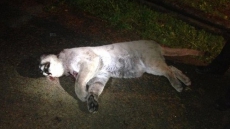WINNIPEG — More than four decades before 15-year-old Tina Fontaine's body was pulled from Winnipeg's Red River wrapped in a bag, the country was shocked by the death of another aboriginal teenager in Manitoba.
Her name was Helen Betty Osborne.
The 19-year-old was abducted as she walked down the streets of The Pas, Man., in November 1971. Later that night, she was stabbed to death with a screwdriver dozens of times.
It would take 15 years before murder charges were laid. An inquiry determined that racism, sexism and indifference in the community marred the police investigation from the beginning.
Her brutal murder 44 years ago, and the long road to justice, are the subject of a recent graphic novel aimed at educating the next generation about missing and murdered aboriginal women.
"Her story is one of the first times that, as a country and as a province of Manitoba, we became aware of things that were happening with our indigenous women," said Winnipeg author David Alexander Robertson.
"That being said, even today not a lot of people are aware or appreciate the impact of that epidemic."
Osborne is not one of Canada's 1,182 missing and murdered indigenous women. RCMP statistics on the file begin in 1980.
Although indigenous women make up 4.3 per cent of the Canadian population, RCMP say they account for 16 per cent of female homicides and 11.3 per cent of missing women.
Writing one woman's story in a graphic novel was a way to bring the issue to a broader — and younger — audience, Robertson said.
"Through her story, we can learn about the residential school system," said Robertson, whose father was from Osborne's reserve. "We can learn about missing and murdered indigenous women. We can learn about racism, segregation, the justice system's treatment of aboriginal people."
Osborne was from Norway House First Nation but had to leave her community to attend school if she wanted to continue her education. She struggled with school in The Pas, but was determined to become a teacher so other children would not have to leave the reserve, Robertson said.
Osborne spent the night of Nov. 13, 1971, with friends and was walking home alone when she was accosted by four white men who had been drinking.
"There was a practice around that time where young men would cruise around looking for indigenous women, because of the preconception of them being easy and that they liked to drink and party," Robertson said.
When Osborne said no, she was forced into a car. She was driven to a cabin where her screams were heard by neighbours. The men took her to a remote pumphouse where she was stripped, beaten and stabbed.
Her body was found the next day by a boy following rabbit tracks in the snow.
Police were unable to gather sufficient evidence against the four men and the case stalled. It was picked up again in 1983 by a constable and one of the four men, Dwayne Archie Johnston, was eventually convicted of murder.
The book has drawn praise from Canadian author Joseph Boyden, who writes about First Nations heritage and culture. He called it "one of the most powerful graphic novels I've ever read."
Justice Murray Sinclair, who co-led an aboriginal justice inquiry in Manitoba after Osborne's death, is also impressed.
"It's a story of racism and it's a story of community coverup," Sinclair said. "It's also a story about how the community in the North has come to terms with its own history around this."
Writing the novel, which is plotted out much like a screenplay, was emotional but vital to help raise awareness, Robertson said.
"I hope that people who read it are as affected, as I was, writing it.
"In the indigenous culture, women are so important and revered. When we lose one, we lose generations. The loss is profound. The movement for change needs to be equally profound."



